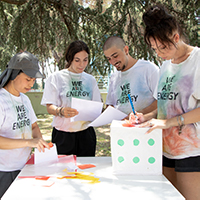What does it involve?back to top
Developmental Psychology, once known as child psychology or adolescent psychology, tackles the underlying topics relating to the development and maturing of individuals. It is a central topic in the study of issues affecting education, and is studied at a university level not only within faculties of Educational Sciences or Training Sciences, but also in faculties of human sciences such as psychology, philosophy, sociology, medicine etc.
Developmental psychology is a discipline that forms part of the psychological sciences and involves the study of the constant modifications and changes that occur in humans at a physical, emotional, sentimental, relationship, cognitive and behavioural level at various stages of life.
Studying human development aims to pinpoint, from amongst the complex phenomena observed, common processes that occur throughout a person’s life (life-span development) and to identify the main factors that cause them. Human development is a complex process, the result of many factors, biological, social and cultural, from birth through to old age.
The current state of the disciplineback to top
Given the complexity of the field, as well as analysing the main theories used to study development, scholars must focus on recent developments in psychological theory, on theoretical approaches that differ from ‘traditional’ evolutionary psychology, and on the changes in perspective introduced by interactionist and contextualist theories, creating a complex and integrated interpretative model of human development.
Developmental psychology, currently a rapidly expanding subject, must tackle the systemic problems caused by the numerous factors and multiple points of view and areas of focus. Indeed, human beings can be defined as ‘open and complex systems’, because they are constantly adapting the way they interact with the outside world.
In Italy, throughout Europe and elsewhere, interest in psychology, and particularly developmental psychology, is constantly increasing. This is proved not only by the exponential increase in the scientific and educational literature on the subject, but also by the creation of numerous degree and specialisation courses and training in this field.
Nevertheless, the increasing amount of study and research into development, the various psychological functions and processes and the use of wide-ranging theoretical models and analysis methods and tools makes an overarching summary of the issues relating to the growth and development of human individuals particularly difficult.
The Degree in Developmental Psychology and Educationback to top
One of the learning objectives of the Bachelor Degree in Developmental Psychology and Education is to study complex and wide-ranging fields like educational sciences and psychological sciences with the aim of acquiring methods of criticism and assessment from the various models, allowing human development issues to be approached from an ‘educational’ angle.
The Master Degree in Developmental Psychology and Education from the «Auxilium» Faculty in Rome promotes the acquisition of basic knowledge and skills, in the fields of educational sciences and psychological sciences, which can be used to analyse the complexity of behaviour and human situations, in particular within an educational context.
It provides basic training to access the subsequent Master Degree in Educational Psychology available at the Faculty, and qualifies students to work as professional psychologists.






